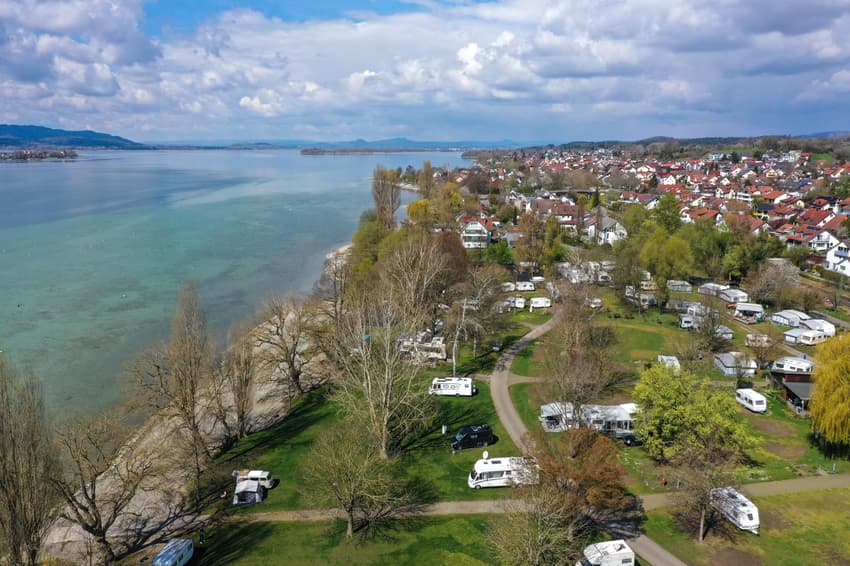EXPLAINED: How Germany is trying to tackle its slow internet problem

German internet is known for being blighted by dead zones and slow download speeds, but the government is hoping a new law will help bring the country into the 21st century. Here's how.
What's going on?
It's no secret that internet in Germany isn't quite up to scratch. In fact, it is often one of the first things foreigners notice after moving to the country.
Most people expect Europe's largest economy to also be a digital powerhouse, but time and time again the country ends up near the bottom of the ranking list in terms of its internet download speeds and latency.
In 2017, Germany came 25th in a ranking of average internet speeds and had slipped further down the list to 38th place by 2021. Though speeds have been gradually improving over the past few years, the latest survey put Germany behind at least 18 other European countries in terms of its internet speed, including Poland, Latvia, Lithuania, Portugal, Hungary, France and Romania.
To try and tackle the problem, the traffic light coalition of the Social Democrats (SPD), Greens and Free Democrats (FDP) have drafted a bill that would give everyone in the country the right to fast broadband.
It was agreed on by the cabinet on Wednesday and will be put to parliament over the coming weeks or months.
READ ALSO: ‘We’re running late on this’: Deutsche Bahn promises better Wifi on German trains by 2026
OK. How fast is fast?
Not insanely fast, unfortunately.
According to the draft, fixed-network internet connections everywhere in Germany must in future provide at least 10 megabits per second (Mbit/s) for downloads and 1.7 megabits per second for uploads to their customers.
This seems particularly low in light of the fact that Germany was recorded as having average download speeds of around 41 Mbit/s back in 2020. Though this looked bad in comparison to somewhere like the Netherlands, where 70 Mbit/s was the average speed, it does make the 10 Mbit/s target seem a bit under-ambitious.
It's worth remembering though that this an absolute minimum standard - so most houses should expect something far above the 10 Mbit/s. And this kind of speed is generally good enough for relatively fast HD streaming and excellent internet browsing.
In addition to the minimum download and upload speeds, the government says the latency (reaction time) should also be no more than 150 milliseconds.
Why are they aiming so low?
According to Transport Minister Volker Wissing (FDP), the minimum requirements are intended to ensure "the digital participation" of all those "who have so far been cut off from coverage".
In other words, the government is more concerned with bringing basic broadband to people in more remote areas than making Wifi speeds insanely fast for everyone else.
Wissing also mentioned that the minimum standards would be redefined year by year. This will take into account the development of internet use in Germany, which changes over the years due to network expansion and new tariffs, he said.
READ ALSO: More than half of Germans regularly experience bad mobile coverage
What are people saying?
Perhaps unsurprisingly, the opposition conservatives aren't particularly impressed with the draft.
Describing the targets as "unambitious", digital policy spokesman Reinhard Brandl (CDU) said people's modern internet usage habits were already being ignored.
"We have considerable doubts as to whether a 10-megabit download rate and a 1.7-megabit upload rate per connection are sufficient as a basic service for a family with children," Brandl said.

Reinhard Brandl (CDU) speaks in the Bundestag. Photo: picture alliance/dpa | Christophe Gateau
When will the changes come into force?
Originally, the ordinance was due to come into effect on June 1st - but the bill still needs to get the approval from the Bundestag and Bundesrat before it can become law.
For that reason, the Transport Ministry is now expecting to miss the June deadline and could introduce the rules later in summer or autumn instead.
What will it mean when the law changes?
For the first time, it will mean that people in Germany have a legal right to certain broadband speeds. This gives them grounds for complaining to network providers if they aren't getting the minimum speed.
It could also give the Federal Network Agency a push to speed up the roll-out of infrastructure that can improve broadband speeds. In some cases, it could arrange for new cables to be laid.
READ ALSO: German mobile networks improve coverage in signal ‘dead zones’
Comments (1)
See Also
What's going on?
It's no secret that internet in Germany isn't quite up to scratch. In fact, it is often one of the first things foreigners notice after moving to the country.
Most people expect Europe's largest economy to also be a digital powerhouse, but time and time again the country ends up near the bottom of the ranking list in terms of its internet download speeds and latency.
In 2017, Germany came 25th in a ranking of average internet speeds and had slipped further down the list to 38th place by 2021. Though speeds have been gradually improving over the past few years, the latest survey put Germany behind at least 18 other European countries in terms of its internet speed, including Poland, Latvia, Lithuania, Portugal, Hungary, France and Romania.
To try and tackle the problem, the traffic light coalition of the Social Democrats (SPD), Greens and Free Democrats (FDP) have drafted a bill that would give everyone in the country the right to fast broadband.
It was agreed on by the cabinet on Wednesday and will be put to parliament over the coming weeks or months.
READ ALSO: ‘We’re running late on this’: Deutsche Bahn promises better Wifi on German trains by 2026
OK. How fast is fast?
Not insanely fast, unfortunately.
According to the draft, fixed-network internet connections everywhere in Germany must in future provide at least 10 megabits per second (Mbit/s) for downloads and 1.7 megabits per second for uploads to their customers.
This seems particularly low in light of the fact that Germany was recorded as having average download speeds of around 41 Mbit/s back in 2020. Though this looked bad in comparison to somewhere like the Netherlands, where 70 Mbit/s was the average speed, it does make the 10 Mbit/s target seem a bit under-ambitious.
It's worth remembering though that this an absolute minimum standard - so most houses should expect something far above the 10 Mbit/s. And this kind of speed is generally good enough for relatively fast HD streaming and excellent internet browsing.
In addition to the minimum download and upload speeds, the government says the latency (reaction time) should also be no more than 150 milliseconds.
Why are they aiming so low?
According to Transport Minister Volker Wissing (FDP), the minimum requirements are intended to ensure "the digital participation" of all those "who have so far been cut off from coverage".
In other words, the government is more concerned with bringing basic broadband to people in more remote areas than making Wifi speeds insanely fast for everyone else.
Wissing also mentioned that the minimum standards would be redefined year by year. This will take into account the development of internet use in Germany, which changes over the years due to network expansion and new tariffs, he said.
READ ALSO: More than half of Germans regularly experience bad mobile coverage
What are people saying?
Perhaps unsurprisingly, the opposition conservatives aren't particularly impressed with the draft.
Describing the targets as "unambitious", digital policy spokesman Reinhard Brandl (CDU) said people's modern internet usage habits were already being ignored.
"We have considerable doubts as to whether a 10-megabit download rate and a 1.7-megabit upload rate per connection are sufficient as a basic service for a family with children," Brandl said.

When will the changes come into force?
Originally, the ordinance was due to come into effect on June 1st - but the bill still needs to get the approval from the Bundestag and Bundesrat before it can become law.
For that reason, the Transport Ministry is now expecting to miss the June deadline and could introduce the rules later in summer or autumn instead.
What will it mean when the law changes?
For the first time, it will mean that people in Germany have a legal right to certain broadband speeds. This gives them grounds for complaining to network providers if they aren't getting the minimum speed.
It could also give the Federal Network Agency a push to speed up the roll-out of infrastructure that can improve broadband speeds. In some cases, it could arrange for new cables to be laid.
READ ALSO: German mobile networks improve coverage in signal ‘dead zones’
Join the conversation in our comments section below. Share your own views and experience and if you have a question or suggestion for our journalists then email us at [email protected].
Please keep comments civil, constructive and on topic – and make sure to read our terms of use before getting involved.
Please log in here to leave a comment.